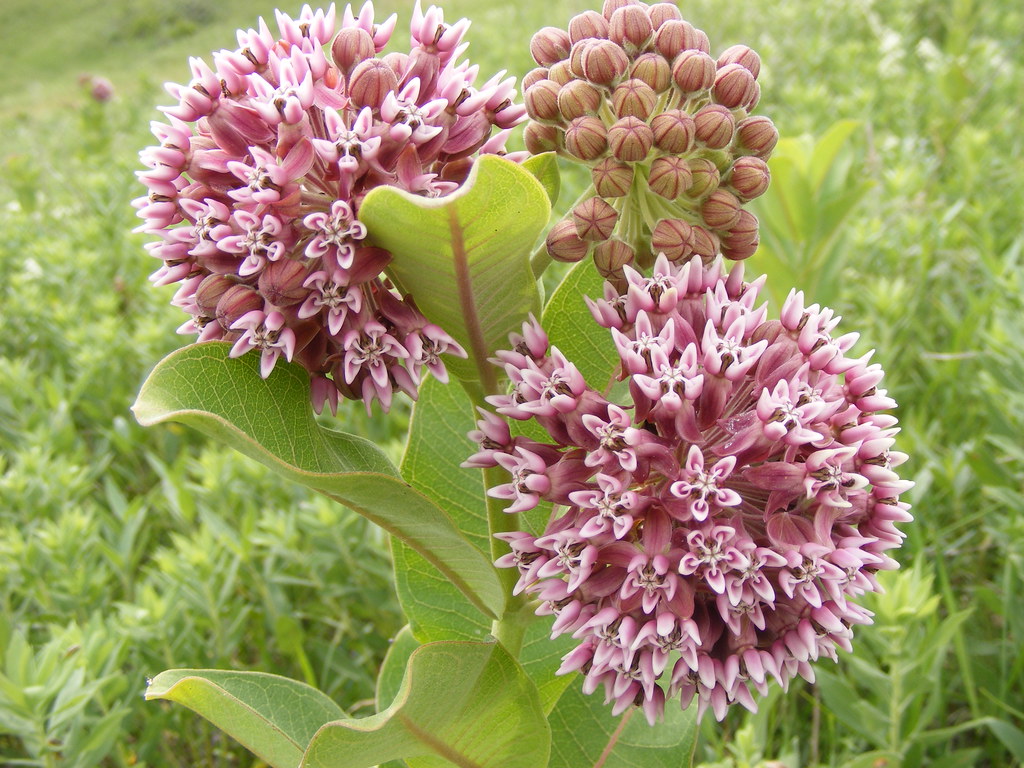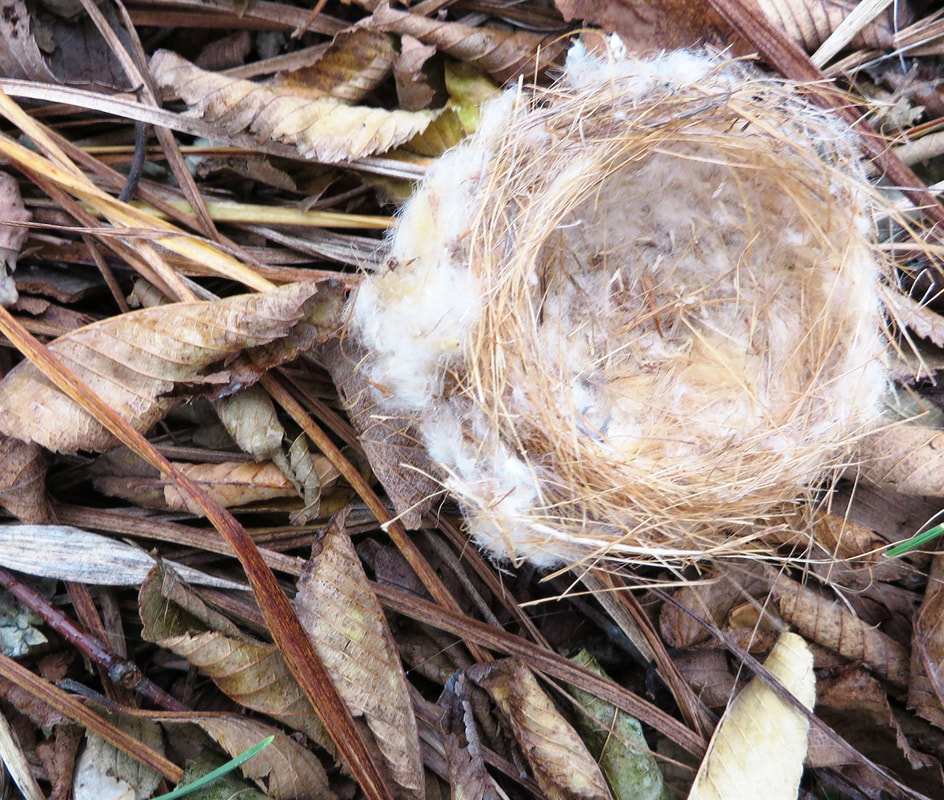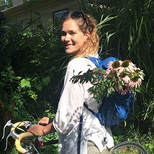Deadheading milkweed flowers in the early summer and cutting back old stalks in the fall are common ways to maintain a healthy milkweed patch!DeadheadingRemoving flowers that have wilted, also known as deadheading, is a great way to prolong blooms in the early and mid-summer. After the first flush of flowers, simply cut off the flower cluster above the topmost leaves on the stem. This will cause the plant to branch out and produce a second flush of flowers. Caution: The milkweed sap can be a skin irritant so be sure to use gloves while pruning. In order for your milkweed to be able to produce seed pods in the fall, deadhead only the first flush of flowers. A single milkweed plant will produce hundreds of seeds and it is the best way to ensure you have seeds for the following year! Learn more about milkweed seed saving here. Milkweed plants are known to spread so if you do not have room for more milkweed plants, cut the pods off in the fall when the pods are tan and the seeds are coffee brown. You can then give these seeds out to friends and family. Some birds are known to use the silky floss of milkweed pods to build their nests. The vermillion flycatcher, black-capped chickadees and Baltimore orioles are some of the known species that use milkweed floss for nest-building. So, once you have harvested seeds, you can toss the fluff back outside! Cut BackIt's always best to plant milkweeds that are native to your area. In Nebraska, we have 17 native varieties of milkweed. These native milkweed are perennials, meaning they come back year after year. Their aerial parts (flower, leaves, stem) die back but their rootstock remains alive throughout the winter. Cut back milkweed stalks in the late fall or winter, after they have produced seed pods and these seeds have had time to mature. Leave at least 6 inches of stalks to provide habitat for insects throughout the winter. Leaving stalks also gives you a marker so you know where your milkweed patch is. Birds such as Baltimore orioles can also strip fibers for nest material. When Spring arrives, you will have an abundance of new shoots and you won't have to do a thing! ResourcesBorders, Brianna and Lee-Mader, Eric. Milkweeds: A Conservation Practitioner's Guide
https://www.fws.gov/southwest/es/Documents/R2ES/Pollinators/8-Milkweeds_Handbook_XerSoc_June2014.pdf Dole, Claire Hagen. Brooklyn Botanic Garden. Milkweeds—Easing the Plight of the Monarch Butterfly. June 1, 2000. https://www.bbg.org/gardening/article/milkweeds#:~:text=Deadhead%20milkweed%20flowers%20to%20prolong,great%20in%20dried%2Dflower%20arrangements.
58 Comments
Margaret Groff
7/31/2020 04:35:21 pm
where can I get milkweed plants now
Reply
John Harkness
8/2/2020 04:21:32 pm
What is the purpose of cutting back milkweed stalks? The text of the article implies that it is better to leave them, contradicting the headline.
Reply
Mary
5/2/2021 01:09:26 pm
I got the impression that the author meant to cut them back to 6 inches, not all the way to the ground.
Reply
o
3/20/2024 09:09:12 am
yes
Donna Davidson
9/9/2023 10:47:04 am
If my milkweed becomes infested with aphids while the caterpillars are on the plant, what should one do?
Reply
Ed from NC
9/9/2023 12:00:40 pm
I've double checked, and all of the organic methods we would use to control aphids, both biologic and organic chemicals, would likely be harmful to the caterpillars. Hopefully someone else is more knowledgeable/experienced and can provide you with a better answer.
Anne-Marie McCarthy
9/10/2023 03:38:07 pm
I have read that you can remove them with a good squirt of water. I just squash them with my fingers because the infestation isn't severe. Lady bugs love to eat aphids. If you have many common milkweed plants, you could purchase live ladybugs but there is no guarantee that they will stay on your plants- they may fly away.
Tami
5/3/2024 03:28:29 pm
Don't be concerned with the aphids. The milkweed is a host plant, meant to be eaten! The aphids are not a problem for monarchs. Also, if the aphids are on your milkweed, they aren't bothering your other plants! Win Win!
Jennifer Perez
9/8/2020 11:03:23 am
I am having a lot of trouble with Tachinid flies killing all my caterpillars. Does anyone have any solutions? Also I have housed as many caterpillars as I can giving them milkweed but half of them seem to be climbing to the top of the enclosure to pupate way to early.( instar 3 and 4s). Does anyone know how to prevent this?
Reply
Elaine
9/14/2020 08:44:56 am
I have problems with predators and tainted milkweed. To avoid the predators, if I see a Monarch lay an egg, I immediately bring it in and raise it in a cage on my lanai in Florida. I rinse the leaf briefly under water and run my finger along it to take off any other “critters”. Also I look at it with my small microscope. As soon as the eggs hatch I cut the leaf and place the caterpillar on new milkweed that I have grown. If a caterpillar ingests milkweed that has been sprayed with weed killer or a pesticide, the caterpillar will most likely stop eating and die, sometimes going into a premature J-hook. It’s quite a challenging hobby but the reward is worth. Good luck. There’s lots of info on Facebook to help you.
Reply
Jennifer
7/7/2021 12:48:24 pm
Is tainted milkweed the reason for caterpillars to vomit?
Jennifer
7/7/2021 12:52:54 pm
I suspected that they were doing that here because they were not getting enough to eat, but you said that you were supplying plenty. Now I don't know what to think! Maybe they are reacting to the amount of light they are getting or the temperature of the room???
Reply
Jamie
9/27/2022 12:24:46 am
Vomiting would be due to bad milkweed. Somehow it was sprayed eirher by a service that was hired or sometimes by the city through mosquito trucks.
Jes
6/28/2023 09:45:33 am
They will also vomit if they feel too crowded or stressed
Marty
11/19/2023 07:28:31 am
Vomiting is usually due to pesticide poisoning of some nature. Even if one doesn’t use chemicals on their plants, consider chemicals from the ground, or touching leaves or caterpillars after petting a cat or dog treated with a flea/tick treatment. The government spraying for mosquitoes that you may no be aware of.
Kathleen Jamison
7/25/2023 08:36:22 am
I'm noticing the same thing. Too small but climbed to the top of my netted container to hatch....help
Reply
Tere Bettis
9/30/2020 05:35:01 am
I have 4 pupae and one “lost” caterpillar. Crawls but doesn’t seem to eat or “J”. Any thoughts?
Reply
10/13/2020 07:10:05 am
What a great post! I really like the tips you shared. I love your advice and such a helpful post. Thanks for sharing.
Reply
10/13/2020 07:11:35 am
Great Post! You are sharing a wonderful post. Thanks and keep sharing.
Reply
1/26/2021 10:57:18 pm
Ця стаття вражає мене. Ви зробили це добре!
Reply
3/11/2021 01:42:51 am
Outstanding post! Thanks a lot for sharing please keep sharing more.
Reply
3/11/2021 01:43:24 am
Informative post! Thanks a lot for sharing this informative post with us.
Reply
6/3/2021 08:40:14 pm
Please update more often because I love your blog. Thank you!
Reply
G.
7/10/2021 05:14:32 am
Purchased milkweed plants (roots with a stem). One even grew wild in the middle of my Vinca patch! I planted in early May, N.E. USA Plants have grown, flowers are lovely. However, not a butterfly to be seen. It is now mid July!
Reply
Lynn
7/13/2022 05:34:10 pm
Same here / healthy plants now tons of seeds / nary a butterfly 😫
Reply
Ed from NC
6/14/2023 04:24:37 pm
We have learned that the monarch butterflies come through our area at a different time than our milkweeds bloom, which means they may not find them. To help the monarchs find our milkweeds, we plant other butterfly attracting flowers that bloom at other times. The monarchs are attracted to these other flowers as they search for food. Being planted among, or near, the milkweeds, the monarchs find the milkweeds as they are gathering food from these other flowers.
Reply
Rick Wilson
7/10/2021 02:01:00 pm
I bought 6 blooming milkweed plants from our local Home Depot! We have allot of butterfly’s!
Reply
Michelle Dellascio
4/7/2022 07:57:11 am
The caterpillars will eat the seed pods too. Just have other plants available for the butterflies to feast on. They don't exactly need the flowers to know the milkweed is there and lay their eggs. ;)
Reply
Kara
5/31/2022 03:02:19 pm
I've heard that Home Depot and other big box stores primarily sell plants treated with the pesticide nicotinamide (sp?), and that is not a good fit for bees, butterflies and other pollinators.
Reply
Juliann jokerst
9/4/2021 08:03:55 pm
I have milk weed an don't know how I got it
Reply
Ben
6/23/2023 01:08:48 pm
Milkweed seeds are mainly spread by wind. The seeds are attached to fluffy parachutes, like dandelions.
Reply
Phil
10/21/2021 01:51:58 pm
Stocks on my swamp milkweed plant is covered in little orange bumps.
Reply
Robin
8/19/2022 08:17:46 am
I gave these bumps too not sure if they are bugs. I’m in CA and it’s late summer
Reply
10/3/2022 12:06:50 pm
Your orange "bumps" are most likely aphids. Aphids suck the liquid out of the plant. Try removing them with your fingers. If there are too many, try washing them away with a spray of water. Do not use pesticides - they will harm monarch caterpillars.
Reply
Patricia Wagner
11/22/2021 04:12:15 pm
Late for this year.—but I saw one mention of light to encourage cating. another place , Xerces Society? The said food must be put in the brightest place where the caterpillars stay attraction to light powerful or they will startve.
Reply
This is a place where you can find information that you can trust, and understand as you observe your importance.
Reply
Lilia Loleng Hernandez
4/20/2022 12:56:00 pm
I live in CA where the weather gets hot in the summer and it rains in the winter but we also get some freeze warnings. I am in 9b zone. How do I grow milkweed?
Reply
Andrew
3/27/2023 09:38:52 am
Google ‘native plants near me’ and see what native plant options are in your area. Near Los Angeles, the Theodore Payne Foundation is an excellent source of CA native milkweed.
Reply
JoAnn Wilkinson
5/16/2022 05:43:22 pm
I have my first two pupae on my lanai in FL. I have ordered a butterfly house. My milkweed s are in pots, and most of leaves are gone, ( eaten or wilted).
Reply
Charlotte Hobgood
6/17/2022 07:05:30 am
I planted new plants this year and they have grown tremendously in two different locations. I have yet to see a caterpillar! Last year I had an abundance and many many monarchs produced. What could be my problem this year?
Reply
Lynn
7/13/2022 05:36:28 pm
Same here / plants healthy now full of seed but no butterflies
Reply
David Spahr
6/30/2022 04:11:55 pm
You need to provide better, more accurate info.
Reply
Renee
8/3/2022 05:13:23 pm
Hi, I've checked all the comments, but I didn't see any about No caterpillars..!! I had Lots of 🦋 and eggs that disappeared. No 🍃 eating that I could see.. Why would this be..?? Thanks to all who posted Helpful Information. From Ontario, Canada 🇨🇦
Reply
Jennifer Compton
9/18/2022 03:47:06 pm
Probably predation, there are a number of insectivores that would eat eggs given an opportunity. In nature the majority of butterfly eggs don't become butterflies.
Reply
Chris Blackburn
8/21/2022 04:10:37 pm
We have a cluster of milkweed plants in the small garden in front of our house. They are over five feet tall now and dominate the garden. We saw a few monarch butterflies earlier in the summer. For a couple of days we watched a caterpillar eat much of our parsley -- it has disappeared now. I gather we should leave milkweed till next month.
Reply
LINDA SAVAGE
8/28/2022 02:35:06 pm
Can milkweed be grown in containers? I live in Ohio.
Reply
Bob Church
8/28/2022 05:11:06 pm
I have about 35 acres of open ground on 155 acre place. I want it to be a managed nature preserve with concentration on the monarch butterflies. I have big sections of common milkweed growing and orange butterfly weed coming on where I wanted to plant more. But I’m not a horticultural expert. And I need professional direction. Where can I get directions?
Reply
Thanks for sharing beautiful content. I got information from your blog.keep sharing
Reply
Victoria Baker
5/3/2023 04:18:15 am
I grew a flat of milkweed that is native to our region. Now I'm not sure I should put it in the ground, because we live in town and they do have a mosquito truck that comes around a few times in summer, which I've learned here would taint the milkweed. I might be able to find a home for the plants on a farm outside town. Other than the city mosquito spraying, I garden organically. Can anyone give me advice?
Reply
Heather Ruby
6/12/2023 10:47:57 am
I have heard and seen how cutting back milkweed around July 4 in md can be helpful. I have been raising for several years now and even wrote a book to share some of the science: Madison hears a Monarch. When preparing for my library presentation last summer I could not find any caterpillars or eggs, except in my friends house, who had been cutting it to let her lillieys bloom, after July when her Lillie’s were finished she let the milkweed grow. The plats were young tender and full of monarchs of all stages in august. My milkweed, and the milkweed at our school was dry with no monarchs. Please share bay insight. A garden club lady helping maintain a butterfly garden shared that you should look for eggs and cut the stalks so new growth would attract the monarch’s. She seemed correct I. August -September those were the only spots I found Monarchs…
Reply
6/23/2023 01:52:07 am
The best way to achieve the goals is to read this article on the most important points.<a href="https://srislaw.com/driving-without-a-license-in-nj/">Driving Without a License in NJ</a>
Reply
7/3/2023 08:05:26 pm
Your writing style is superb! The way you articulate complex ideas with clarity and precision is impressive. It's a pleasure to read your blog and absorb your insights.
Reply
Gerry Marcus
10/10/2023 10:06:58 am
Great info, thanks
Reply
4/24/2024 09:57:24 pm
I'm deeply appreciative of the expertise you've shared in this post. Your breakdown has enhanced my understanding in profound ways. I recently delved into a related subject on my blog illicium london, and I believe our perspectives could complement each other wonderfully. Looking forward to continued dialogue!
Reply
Leave a Reply. |
AuthorRebecca Chandler Archives
March 2024
Categories |




 RSS Feed
RSS Feed